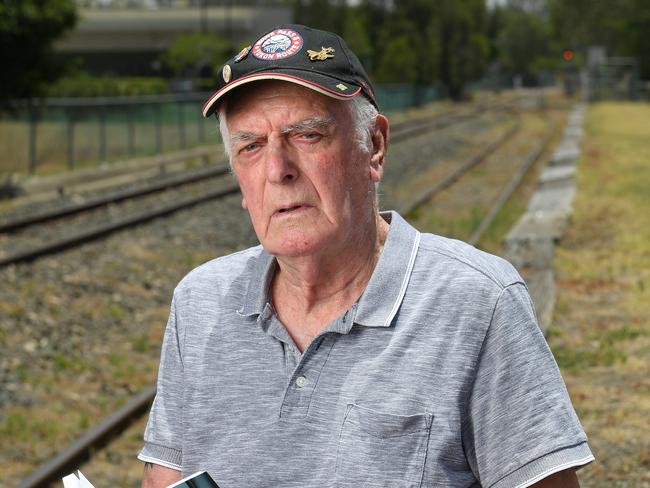Defence Force Retirement and Death Benefits Scheme Senate Inquiry brings disappointment for retired RAAF member Jim Nicholls
Hopes of good news to come from a recent senate inquiry into his retirement benefits delivered further disappointment for former RAAF member Jim Nicholls.

Ipswich
Don't miss out on the headlines from Ipswich. Followed categories will be added to My News.
IT was meant to be the light at the end of a long, dark tunnel for more than 50,000 retired Australian Defence Force personnel.
Instead, ex-RAAF member Jim Nicholls was among the thousands to watch on in dismay as the recent senate inquiry into the Defence Force Retirement and Death Benefits scheme delivered its recommendations.
Mr Nicholls, of Laidley, has put considerable time and effort into advocating for veterans who he claims were misled into accepting a commutation payment on their entitlements decades ago.
In exchange for the lump sum payment, retiring ADF members accepted what they believed would be a finite reduction on their regular retirement pay.
Mr Nicholls and others in a similar position say they have continued to have their pay reduced years after reaching what was known as a “Notional Life Expectancy”, with many of them paying back their commutations several times over.
“Some 55,000 of us maintain we were misled and deceived when electing to accept a lump sum advance of part of our DFRDB retirement pay,” Mr Nicholls said.
“Although our understanding was the lump sum would be repaid over a period known as our Notional Life Expectancy that turned out to not be the case.
“Despite having brought these concerns to the Commonwealth’s attention on numerous occasions over past decades, the parliament continues to treat the matter with indifference; our pleas for understanding and justice are simply ignored.”
After a long fight from veterans, the Foreign Affairs, Defence and Trade committee was charged with inquiring into the accuracy of information provided to DFRDB members about the effects of commutation on future retirement pay entitlement, the consequences of this, and what remedial action could be taken.
The inquiry was established by Labor on March 18, with the committee including both Government and Labor Senators, as well as independent Senator Jacqui Lambie.
The Senate Inquiry conducted earlier this year finally promised veterans a chance at being properly heard.
“Like many other members, my hopes and expectations were raised by the announcement of the inquiry, and I dedicated considerable time and energy to making my submission,” Mr Nicholls said.
“I then watched the proceedings’ telecast, almost in horror, as poorly prepared Senators conducted a short hearing that barely scratched the surface of the issues. It was obvious they weren’t too sure of just what it was all about.”
While noting the committee’s report quoted extensively from veterans’ submissions, Mr Nicholls said the report did not properly analyse the content of those submissions and seemed to ignore the issue at hand.
He described the report as superficial and the recommendations as farcical.
One of those recommendations is to further educate cadets on the DFRDB scheme, however, Mr Nicholls pointed out that the scheme had not existed for about 30 years.

“The second recommendation put forth by the Committee rehashed the old standby of members claiming under the CDDA scheme for reimbursement of perceived financial loss caused by the misinformation given out at the time of retirement,” he said.
“The Department of Defence has advised that of a total of 36 claims received and processed so far, all have been knocked back.”
Central to the argument of former ADF members is that they were deceived about how the DFRDB scheme operated.
The report from the Inquiry notes: “Despite the findings of the Commonwealth Ombudsman, some DFRDB members remain strongly of the view that they have suffered financial detriment based on their understanding at the time, which is actually a misunderstanding of how the scheme operates”.
“In other words, the financial detriment is perceived rather than actual as it compares their current financial situation to a scheme that does not exist in law, ie claiming an actual loss as opposed to a financial disappointment,” it noted.
The report was adopted unanimously and was welcomed by Blair MP and Shadow defence spokesman Shayne Neumann this week.
A supporter of former defence personnel seeking compensation for the scheme, Mr Neumann said it had to be acknowledged that as yet there have been no successful claims by DFRDB members under the Commonwealth’s Compensation for Detriment caused by Defective Administration (CDDA) scheme, “which suggests more support may be needed to help members access the scheme to make a claim and appeal any adverse decisions,” Mr Neumann said.
“Further, the Committee considered that, for DFRDB pensioners who were unsuccessful in their claims and any appeals, some form of reparation payment would be appropriate as a fallback.
“These payments would recognise ‘the Government’s moral obligation to address the confusion and distress suffered by DFRDB members as a result of defective administration.”
Mr Neumann said the Inquiry was a vast improvement on previous investigations conducted into the scheme and called on the federal government to “do the right thing” and respond to the recommendations.
The full report is available here:
https://www.aph.gov.au/Parliamentary_Business/Committees/Senate/Foreign_Affairs_Defence_and_Trade/DFRDB



